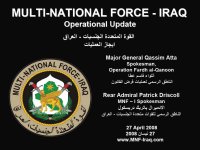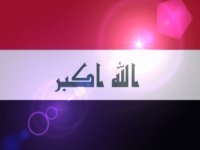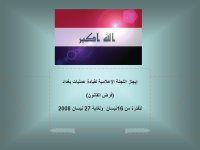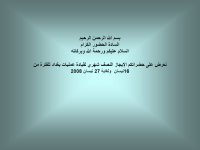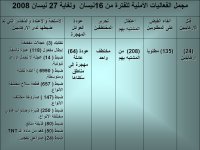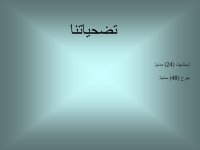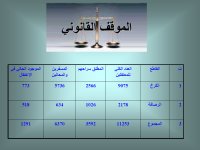
PRESS CONFERENCE: Operational Update: Rear Adm. Driscoll, Maj. Gen. Atta, April 27, 2008
Multi-National Force-Iraq
Sunday, 27 April 2008
PRESS CONFERENCE:
Rear Admiral Patrick Driscoll, Spokesman, Multi-National Force – Iraq
Major General Qassim Atta, Spokesman, Operation Fardh Al-Qanoon
DATE: April 27, 2008
TRANSCRIBED BY: SOS INTERNATIONAL LTD.
PARTICIPANTS:
Rear Admiral Patrick Driscoll
Major General Qassim Atta
REPORTERS:
Abigail Housliner from Time Magazine
Tina Susman from The Los Angeles Times
Unidentified reporters from McClatchy Newspapers, NINA Agency, Al-Salam TV, Radio Sawa, and The Washington Post.
REPORTERS 1-12
*REP1 = REPORTER 1
RDML DRISCOLL: As-Salāmu `Alaykum and thank you for joining us here this afternoon. Today we’re going to talk a little bit about Baghdad and Basra security and also some reconstruction efforts that are going on in both places. I would like to welcome my good friend, Major General Qassim Atta, for joining me here today—spokesman for Fardh Al-Qanoon. He’s going to begin with a statement and then I’ll have a few remarks and then we’ll take your questions.
MAJ GEN QASSIM: Thank you very much. [Continues speaking in Arabic.]
INT: As-Salāmu `Alaykum everyone. I’d like to thank Admiral Driscoll for inviting us here today and I also thank you for coming here today. Actually now we will talk about the security operations in Baghdad ever since April 16. First, during the meeting of the supporting committees in our Operation Fardh Al-Qanoon that was held on Friday, April 25th, 2008, we discussed the services and the basic services…providing the basic services in Sadr City and Shoala neighborhood and we allocated $100 million to reconstruct the infrastructure and also to provide the basic services in Sadr City. And also we allocated $50 million to restore the services in Shoala neighborhood. We also formed a committee to provide the services and to follow up providing the services with the humanic [sic] operation in Baghdad with a representative from the…from Ministries of Health, Oil, Trade and Amanat Baghdad and also Baghdad Provisional Council in addition to the Multi-National Forces. Also, this is done with the Supreme Committee with the supporting committee that supports Operation Fardh Al-Qanoon. The committee will discuss the issues of schools and the government buildings that are actually now not working so that the students can resume going to schools. The committee will also work on setting a mechanism to provide and distribute the food rations to the people in addition to providing the fast solutions to remove all the trashes and also the problems in sewage and electricity and water, and also to compensate those who have been harmed due to the military operations. I think you followed up yesterday the actions of the…one of the committees, and the committee started to provide services through Amanat Baghdad. And we have sent services and engineers from Baghdad Amanat to initiate removing the trash and also to restore providing the basic services like water and electricity. And the committee will also…held sessions and meetings on a daily basis to follow up all the…all that is being done. The Ministry of Health also provided 12 vehicles with…filled with medicine and they sent them to Sadr City during the past two weeks. And the minister also sent medical staff to carry out surgical operations in the city…in the hospitals in Sadr City. Minister of trade also. And in a late hour, we were talking with the Minister of Trade, and he told us that the food rations for April has been distributed for most of the people in Sadr City. And the Minister of Oil also said that 58 tanks of oil and benzene was…and gas also was distributed to the people. Of course, there are some huge efforts and…that are being exerted to serve the people and also to mitigate the tension and…over the cities…the people in Sadr City. And some reports talked about a siege over Sadr City by the Iraqi Security Forces or the Multi-National Forces, and we would like to say the following facts. The security forces decided to impose the curfew on the vehicles and people in all Baghdad, starting from March 27 until March 28 and then this curfew was removed. The roads that lead to Sadr City was implanted by…or were implanted by IEDs and mines, and the Iraqi Security Forces exerted a lot of effort through their engineering battalion to remove all those IEDs and clear the main entrances of Sadr City and to establish main checkpoints to control the city and those routes and roads to prevent the outlaws from getting any supplies from nearby areas. And you know that there are three main entries in Sadr City near the…in the Sahat, in Wahadan[ph] Square, and Talbiya Square, and those entries are open now for the people to be used except the bridge that leads to Madafur [ph] Square. And it was…and, as you can see, this is the map of Sadr City and those are the three entries: Madafur[ph] Square and Talbiya[ph] Bridge. In addition, there are some other entries from Baladiyat neighborhood. This is another entry from Hamza Square or area. This is an entry from Kasa Al-Atash area. This is another entrance from Area 83. And those entries are open, and I believe that the media covered everything and covered all those entrances and how actually they are open in front of the citizens and also for the vehicles. But I have one point that Madafur Square is located only to enter the food and the ambulance vehicles. The other entries include also checkpoints that check the identification of those people who go in and outside Sadr City, and this means that there is no siege around Sadr City. And the commanding…the commanders…the field commanders said that everything is normal in Sadr City, but there are some places in Sadr City that still a combat operations…or witness the combat operations, and also witness some casualties. The other point…the other important point, after receiving tips from people that there were some dead bodies in Mahmudiyah, the 6th Division went on and searched the neighborhood. And after the search operation that took three…several years, the security forces found 51 unidentified dead bodies that belonged to civilians and military personnel, and they were killed by the terrorist groups within the past two years. The remains of the dead bodies were taken to the medical institute and Mahmudiyah Hospital, and some of the victims were recognized there—the casualties. And a committee was formed by the Prime Minister Maliki to investigate the…this incident. The…and due to the security improvement in different places in Baghdad and following instructions from Prime Minister Maliki with coordination with the Baghdad Operation Command and Amanat Baghdad and the traffic directory, the main road that leads from…in Al Wathuk[ph] that leads to Al Wathuk[ph] Square was opened and reopened. And another road was also opened in Al Adhamiyah District, and this, in turn, alleviates the traffic jam and also provides more freedom to the citizens to move from one neighborhood to another in Baghdad. Regarding the security operations and achievements within the ten past days…past ten days, we killed 24 terrorists and we captured 135 wanted individuals, and that was based on court orders. And we detained 108 suspected individual. We liberated one kidnapped. And 46…and 64 families have returned to their…or displaced families were returned. And we defused thee car bombs and 118 IEDs. And all this was done by the engineering battalion and the Iraqi Security Forces and the ordinance disposal teams. And we also seized 40 vehicles that carry no license and over 6,000 different kinds of weapons and 670 different kinds of weapons and 160 different kinds of rockets and mortars and over 274 wires…detonation cords and also a large amount of TNT. Regarding the detainees and those who have been released for the operations in Karkh, now we have 737. In Rusafa we have 518. The total number of the detentions—1,290. Those who have been presented to court—6,370. Those who have been released—3,090. The total number of the detainees are 11,250. Thank you very much, and thank you for Admiral Driscoll.
RDML DRISCOLL: Thank you General Qassim. As General Qassim noted, we’ve had significant achievements in the fight against criminal groups over the last several weeks. In Basra and Baghdad, the Iraqi Security Forces have demonstrated bravery and professionalism and have made great strides in securing those areas where Iraqis were held hostage to those who opposed the rule of law and committed acts of violence that endangered innocent Iraqis. With the Iraqi Security Forces in the lead and Coalition Forces supporting, security operations are still ongoing, as criminals in some areas continue to challenge the government and the rule of law. However, operations over the last several weeks have been successful. In many areas that had fallen prey to criminal gangs, extortion, and intimidation, we now see the markets open, people are out, and the streets and neighborhoods are safe again. It is important to note that the Government of Iraq is moving quickly to sustain these security gains by focusing on redevelopment efforts. The Government of Iraq has taken the lead in funding and conducting reconstruction operations to help Iraqis rebuild their communities and get back to a normal life. In Basra, the Iraqi Security Forces have flushed out criminals in neighborhoods like Hiyanniya and Qibla. As normal life returns, the Government of Iraq is taking the initiative to revitalize these districts. Prime Minister Maliki designated over $100 million for reconstruction projects in Basra. This reconstruction campaign is essential. It builds on the security gains and increases the people’s confidence in the local governance. Coalition forces reprioritized funding to accelerate the execution of reconstruction efforts in Basra in order to directly support the Government’s reconstruction campaign. This will help facilitate the quick delivery of essential services, get businesses going again, and provide basic aid to the local populace. To focus this effort, the coalition expanded the capacity of the Basra Civil Military Operations Center, known as the CMOC, and doubled the number of civilian affairs personnel to support the many reconstruction efforts underway in the city. This means that the CMOC personnel are teaming up with Iraqi officials to coordinate and expedite projects in Basra. Members of this team include the Government of Iraq, the Basra Provincial Council, the Basra Governorate, the U.S. Army Corps of Engineers, and other organizations. Aside from coordinating projects, CMOC personnel are also directly involved with the Iraqi Security Forces. CMOC team members join the ISF on inspections of secured neighborhoods in order to assess the immediate needs of the residents. Once they determine what the people in that neighborhood need, they build a prioritized list of requirements for each district. CMOC planners then coordinate the right kind of reconstruction projects for each district. So far, projects in Basra vary from rehabilitating sewage lines and installing new street lights to rehabilitating businesses and providing urgent medical care. As Major General Qassim said, similar reconstruction operations are taking place in East Baghdad. Reconstruction takes time, but the Government of Iraq has shown great courage and commitment to the people of Sadr City and Basra to first establish security and then dedicate themselves to improve the quality of life in each of these neighborhoods. Coalition Forces remain dedicated to supporting the government in giving Iraqis security, normalcy, and the freedom they deserve. With that we’ll take your questions. Ma’am.
REP1: [Unintelligible] with McClatchy Newspapers. How safe is it for residents to be living in Sadr City especially, and also Basra?
RDML DRISCOLL: Would you take the Sadr City?
MAJ GEN QASSIM: Yes. Shukran jaziilan. [Speaks in Arabic.]
INT: Actually, within the past few months, Sadr City witnessed a presence of the outlaws and this made the security forces to intervene strongly to eliminate those groups that tried to destabilize the situation and also tried to achieve their own goals. It’s been now a month ever since the military operations in Sadr City started, and as I have said a moment ago, that life has returned to its normal… normally in most of the places in Sadr City. Most of the roads were closed due to the IEDs and the presence of the IEDs. The Iraqi Security Forces, with coordination with the Multi-National Forces, exerted a lot of effort to clear those roads from the IEDs. We reopened several roads, and there are some certain roads that are still closed inside Sadr City and the areas that are actually now a foothold for the outlaws, and we are dealing with those groups.
RDML DRISCOLL: As far as the security in Basra, I think it’s improved dramatically over the last several weeks, as we’ve had successful operations in neighborhoods. We’re now seeing the Iraqi Security Forces working in the Five Mile Market, and they’re not meeting a lot of resistance. The people of Basra are coming back out. We’ve had reports down from the Ministry of Interior, the director of operations that people are back out, going back to their schools, and enjoying life again. Once again, this is the process we’re hoping for, where security is established and then that will allow us to bring in the services I mentioned and also let people get back to a normal life. Sir.
REP2: As-Salāmu `Alaykum. [Asks question in Arabic.]
INT: NINA Agency. Question to Major General Qassim Atta. Some American officials said…and they always say from time to time that the security situation is fragile now, and that the Iraqi forces are unable to control the security situation and handle it alone. On the other hand, there are some Iraqi military officials who say there is a slow process in the American support in building the Iraqi Army. In your opinion, when will you think the Iraqi Army be strong so that the Iraqi Army could stand alone in fighting the troubles?
MAJ GEN QASSIM: [Speaks in Arabic.]
INT: All those who follow up with the process of building the Iraqi Security Forces can see that there is a huge development in the building of the Iraqi Army and also in the formations of the Ministry of Interior. We have started with one brigade in Baghdad—this is concerning the Iraqi Army—and now we have 14 divisions…military divisions; the division contains three brigades or more. And this means that there is a good development. We started with simple weapons…simple small weapons, and now we have modern supplies and equipment to the Iraqi Army. We have fought terrorism and all those outlaws from the militias and the criminal gangs for the past four years in a continuous way. We build the Iraqi Security Forces from one hand and fight the terrorism from another hand…on the other hand, that is. And so there is a good progress and, of course, there are challenges that face the security forces. And now the Iraqi Security Forces are exerting efforts in Basra, in Wasit Province, Diwianiyah, and also in Baghdad, Diyala, and Ninawa. And in some fights…battles, they stand alone…and stand up alone with some little support…logistics support from the Multi-National Forces. We confirm that the troops are developing. Yes, there could be some violations…some security violations, and this is why they call it “fragile”—the security situation. We have full control on some areas and they witnessed a good situation. Now things are much better than before. We expect that we are in a good stage in building the armed forces…the Iraqi armed forces and that includes the training, the financing, and equipping as well.
RDML DRISCOLL: Sir.
REP3: [Asks question in Arabic.]
INT: There is no doubt that the situation in Sadr City is not normal, and this caused suffering to the people there. Is there any timetable to end the military operations in Sadr City so the people could resume their life normally?
MAJ GEN QASSIM: Shukran jaziilan. [Continues speaking in Arabic.]
INT: The battle now by the Iraqi Security Forces is not a regular one, it’s a…or what is called as fight inside the…or street fight, where the most important thing is to take care of the civilians in Sadr City. And as you know, Sadr City is about…is a large area, which…and it’s about 25 square kilometers and it has 79 sectors and the population in Sadr City is about 3 million people. And this means that when you fire a single round, it will fall upon a citizen. That’s why the Iraqi Security Forces are keen to conduct their operations in…with precision, with coordination with the Coalition Forces. Our operation is gradually now developing. The Army and the national police are all distributed there. And as the commanding operation in Baghdad said a few…four days ago, we are the first square in Sadr City. We have sent reinforces. Now those troops control the area in a good way, and also provide some urgent and services to the people in Sadr City. Our basic concern is to restore stability and security to the people and to eliminate the outlaws and restrict weapon with the Iraqi Army so that we can start the reconstruction and start providing the basic services. There are so many projects that are still waiting to be initiated and all this is not being done due to the presence of the outlaws in this city. We have some good military plans and, hopefully, we will work much better so that we can stabilize the situation with coordi-…with help, of course, from the people in Sadr City. And the people also helped us through the information and the tips that the citizen provide us about the movement of the armed groups and the outlaws in the city.
RDML DRISCOLL: Sir.
REP4: [Asks question in Arabic.]
INT: Salam TV. Major Atta. My question is about the…returning the displaced families in Adil and Jamir[ph] neighborhood. The return of those displaced families is not really that good. The second question; could you describe the security situation in Al Jihad neighborhood and Radwaniyah area? And we hope that you take us on a tour so that we can see those places.
MAJ GEN QASSIM: [Speaks in Arabic.]
INT: Thank you for this question. All those who follow up for the field and the security operations, you can see that there is a development in Al-Adil and in Janya[ph] neighborhood. We have cleared those two places by the security forces…by the Army and the police and the national police, and we have also established police stations in both areas. And also we’ve opened some joint security stations that also concentrate on providing the services…the security and the services. Our information is that the situation is now stabilized and there are, yes, some displaced families that are going back, but not all of them, because some of them are afraid of the terrorist groups that might return. But we need to build trust in those people and those citizens ever since each returned to any family will also restore the…a best situation. There are also, of course, committees established…or formed by Prime Minister Maliki that work on bringing back the displaced families and giving them some money. There are also developments in those areas. And hopefully we will take you one day in a tour. And we do always take the generals through the commanding operations and tour and give them an idea about the operations. The places…the situation in Jihad neighborhood is also stabilized. In general, everything is much better than it was before the Operation Fardh Al-Qanoon started. We have eliminated most of the terrorists and the outlaws in most of the places in Baghdad, but there are, of course, some groups that work in certain places that try to conduct some terrorist actions and this is also…is being dealt with with the commanding operations in Baghdad. And we follow up with this one.
RDML DRISCOLL: Ma’am.
REP5: Abigail Housliner. Time Magazine. We know of at least three bombings in Amariyah and Mansour since last night alone—one targeting the Sahwa Council in Amariyah. And I’m wondering if this is an indication…if you are reading this as an indication that al-Qaeda is taking advantage of the focus on Sadr City and making a comeback in some of these neighborhoods where it was formerly pretty strong?
MAJ GEN QASSIM: Shukran jaziilan. [Continues speaking in Arabic.]
INT: Well, thank you. This is a really important questions. We have witnessed a terrorist attack in Mansour District, and especially in Abu Ja'far Mansour Square…there was an IED that was left inside a store, and immediately the Iraqi Security Forces and the intelligence and the Iraqi Army gathered information, and after five hours exactly, we have detained the person who left this IED in this…inside the store, and also we have detained a woman who used to photograph the operation with a camera. This is an indication that there was a good response by the Iraqi Security Forces. And I’ve mentioned awhile ago that, yes, there are some certain groups that work in certain places in Baghdad—in Mansour District, in Amariyah, for instance. As you’ve seen, there was an IED explosion. But if we compare this with these operations with the IED explosions before Operation Fardh Al-Qanoon, we used to have over 75 IEDs before Operation Fardh Al-Qanoon, and I think the difference is really huge. Thank you.
RDML DRISCOLL: And just to add, no doubt al-Qaeda still remains a very viable threat, a very lethal threat here in Iraq as we saw with the attacks in Mosul yesterday—two car bombs. So, it’s still a focus of effort that we take very seriously and we are pursuing al-Qaeda with great intensity.
REP6: As-Salāmu `Alaykum. [Speaking in Arabic.]
INT: Question from Radio Sawa. Admiral Driscoll. About Sadr City, there are a lot of civilians who were not included in the armed operations, like the women and children. And the hospitals received several wounded from the women and children due to the snipers. Are they also part of the operations that are going on to clear Sadr City from the armed groups? And question to General Atta. Al- Saidiya neighborhood—or district—and there are some places in those…in this district that has not been cleared so far. So what is your…?
MAJ GEN QASSIM: [Speaks in Arabic.]
INT: What areas in Saidiya? We have five neighborhoods in Saidiya.
REP6: [Speaks in Arabic.]
INT: Well, there are some complaints by the people and they told us that not all the places have been cleared in Al-Saidiya neighborhood and there are some terrorist activities going on in some of the places.
RDML DRISCOLL: The…I think your question is, you know, what kind of tactics are we using? What type of procedures are we using? We’re using the procedures that are best suited to work in that urban environment to protect the people that criminal gangs operate in. You know, anytime a civilian is injured in an operation, our condolences go to them, we investigate. And it’s important to remember, though, that if you’re setting up a mortar tube or a rocket launcher or you’re about to shoot an RPG and you are amongst civilians, you are…it’s the individual’s responsibility that’s bringing that danger. And both Iraqi Security Forces and Coalition Forces go to great lengths to ensure before they do an engagement to protect those people, and many times they won’t engage because there is an opportunity perhaps of collateral damage hurting these innocent civilians. But once again, it’s a very difficult fight for those Iraqi soldiers, policemen, Coalition Forces when the enemy…when the criminals are out there doing that activity, hiding in the vicinity of schools and things like that. All the way back.
REP7: [Asks question in Arabic.]
RDML DRISCOLL: Oh, I’m sorry. They didn’t….
MAJ GEN QASSIM: [Speaks in Arabic.]
INT: …district witnessed a really good development. This district was really a scene for the terrorist acts. We all the time…we suffered lots of casualties, and we’ve heard a lot of displacement and explosions going on after we set a plan. And I think everyone remembers that we used to sit in this place and Prime Minister Maliki ordered to resolve the situation in Saidiya, we asked for volunteers from the Awakening that is from the Al-Saidiya neighborhood. And the first group was around 100 volunteers and provided that they come from all different religious and sectarian backgrounds and they contributed largely in stabilizing the situation and also providing support to the Iraqi Security Forces. Now the situation is different in Saidiya. We have five different neighborhoods, and there is a good development. The district was visited by the Minister of Defense and the Ministry…the Minister of Interior and the commanding operation in Baghdad and the National Security Advisor and other military commanders as well. There are some certain places in Al-Saidiya neighborhood, oh, district, and we try to deal with this with precision. And we have some objectives that are actually monitoring or monitored by the intelligence service. And, thankfully, everything is being…is under control by the 1st Battalion in the 3rd Brigade, the 6th Iraqi Army Division. And there is relief among the citizens for the good performance of the Iraqi Security Forces.
REP8: Thank you. Tina Susman from The Los Angeles Times. This is a question for Major General Atta. Lately, the Pentagon has been making some new accusations alleging increased Iranian activity in Iraq. And I’m wondering if the Iraqi Security Forces agree with these accusations, and, if so, what kind of examples or evidence can you tell us about that leads you to believe that Iranians are increasing activities in Iraq?
MAJ GEN QASSIM: [Speaks in Arabic.]
INT: Thank you very much. Most of the mortars and the Katyusha rockets, the Grad rockets that were launched for the past month and they are a total of 712 rockets, most of those rockets were made…were actually Iranian-made, and they entered Iraq through different ways. And the Iraqi Security Forces are still following up with this. And we also sent detailed reports to the…to Prime Minister Maliki. We wish from the neighboring countries—not only Iran, but the other countries as well, because we have borders with six countries—we hope that they help the Iraqi people and the Iraqi government and the Iraqi Security Forces in controlling the borders and to commit with the security agreements and the combined…or joint security agreements with the Iraqi government because Prime Minister Maliki said the security and the stability in Iraq is…will be reflected on the neighboring countries. And we hope that the neighboring countries could also control the borders and prevent the entrance of the rockets and the car bombs and also the terrorist individuals to Iraq. Thank you.
RDML DRISCOLL: Sir.
REP9: Me?
RDML DRISCOLL: Behind you. We’ll get you next time.
REP10: [Asks question in Arabic.]
INT: Question to General Qassim Atta. Of course, if you have detained some of those outlaws during an operation, let’s say, of course there should have been an investigation. Could you give us their motives and what their backgrounds? The second question is to Admiral Driscoll. How could you avoid…in case you use force, how could you avoid hurting the casualties or causing casualties among the civilians in case you launched an air strike?
MAJ GEN QASSIM: [Speaks in Arabic.]
INT: Well, I’ve talked and I’ve given numbers of those who have been detained and numbers of the suspects and those actually Iraqis and they belong to terrorist groups and the outlaws. We know the goal of the outlaws and the criminals, and everybody knows their goal. Regarding the investigation, there are some…of course, we do investigate, and there are some committees that investigate with all those who have been detained or captured. Those things are actually confidential; however, the terrorist groups and the outlaws and the criminal gangs have the same goal, that is to destabilize the democratic process in Iraq and to destroy Iraq, and also to incite sectarian sedition in Iraq. As Iraqi Security Forces, we refuse all this, and we are keen that the government is the only one that possesses weapon and that the Iraqi Security Forces will be the only authority that carry weapon. And we talked about there are some weapons are actually banned for the civilians.
RDML DRISCOLL: The second part of your question, both Iraqi Security Forces and Coalition Forces go to great extremes to protect the innocent civilians in Baghdad and elsewhere in the country as kinetic operations go forward. [Clears throat.] Excuse me. [Clears throat.] You’ve got to remember, though, that they’re being…they are engaging these people…these criminal elements in Sadr City or anywhere, because they are launching attacks that are often injuring and killing dozens of innocent civilians. And so, it’s a mission that’s very difficult. It’s a mission that forces are trained very carefully for and very specifically, and that do very well in general. And so, every opportunity is afforded in order to protect innocent life during any kind of kinetic engagement. Sir.
REP9: [Unintelligible] with The Washington Post. A couple of questions. One question for Atta. Can you tell me how many SOI members the government has integrated into the security forces—either Army or police—in the last, I guess, six or seven months? And a question for Driscoll. Are you satisfied with the pace of integrating those men into the Iraqi Security Forces? Thanks.
MAJ GEN QASSIM: [Speaks in Arabic.]
INT: Could you…integrating the Awakening or the members of the former Iraqi Army? Are you asking about…? Sons of Iraq. Yes, of course, there are a lot of…large number of volunteers from Sons of Iraq or “Awakening,” as they are called. And we have integrated over 12,000 volunteers to the Iraqi Security Forces after they met the…all the instructions and needs. We also aspire to integrate further numbers of those people into the Iraqi Army and police so that those people could contribute in defending Iraq and also to contribute in stabilizing the situation. It is not necessary that all the volunteers will be accepted to the Iraqi Security Forces, but we can add further numbers to the other ministries, and that is based on their scientific qualifications for those people. And the process is ongoing. We have a coordination with the Multi-National Forces and the commanding operation in Baghdad, and we have also coordination with the follow-up committee from the national reconciliation that was formed by Prime Minister Maliki. And there is a transparency in this process so that we can expedite the integration of those people to the Iraqi Security Forces.
RDML DRISCOLL: And just to add to that, there is a robust program to transfer the Abnal Iraq into the security forces if they so desire. But if they don’t, there is also another option of receiving vocational training. And the process is being set up where they can receive training in some kind of a technical area like computer repair, cell phone repair, welding, carpentry…things like that. And this vocational training is designed to transfer them from the security position in the Sons of Iraq into the workforce and that’s ongoing.
REP9: But the question is, are you satisfied with the pace of integration into the Iraqi Security Forces.
RDML DRISCOLL: Well, once again, it’s…it is a process that’s still maturing, and when you’re talking the process, they’ve got to be able to pass the test, so they have to be screened. They have to be able to have a certain degree of reading skill. So, all those processes take time to do the tests and evaluation. Could it be quicker? It probably could. But I think there’s been great progress made, especially in the options provided them to not only go into Iraqi Security Forces but also to go into vocational training to learn a skill to enter the employment process. Sir.
REP11: As-Salāmu `Alaykum. [Continues speaking in Arabic.]
INT: Major General Qassim. Disarming the militias—when will that happen, and how?
MAJ GEN QASSIM: [Speaks in Arabic.]
INT: Ever since Operation Fardh Al-Qanoon started on February 14th, 2007, we have said that the Iraqi Security Forces are working to eliminate the terrorist groups and the criminal gangs and the outlaws as well and to disarm the militias. Disarming the militias means we’re not targeting a certain militia. This is the job of the Iraqi Security Forces. We want that the government possesses the weapon only, and no other side. Some of the political sides…and this has to do with some political aspects as well. We need a support by some political sides, of course. Operation Fardh Al-Qanoon received approval from all the lawmakers in the Council of Representatives. And I think you followed up with this, and they approved disarming all the militias. Now it is time to apply this, and everyone should announce that the militias are being disarmed so that we can build and head towards building the new Iraq through the elections, and that the Iraqi Security Forces will be the only one that carries weapon. And we see through the media only that there is a serious desire by all the politicians and, of course, with absolute approval from the Council of…members of the Council of Representatives and that they say that they want to disarm the militias and to head towards the political and the peaceful process of building Iraq.
REP11: [Asks question in Arabic.]
MAJ GEN QASSIM: [Speaks in Arabic.]
INT: It is not easy, and it’s full of challenges but the security forces are able to disarm the militias so that we can give…but we need to give more space to the political leaders so that they could contribute peacefully in building the new future of Iraq
RDML DRISCOLL: Time for one more question, I think. All the way in the back row.
REP12: Shukran jaziilan. [Asks question in Arabic.]
INT: I’d like to ask Major General Qassim Atta—have you found any evidence in Baghdad about the Iranian involvement in the events in Baghdad as it happened in Basra? The other question is to Admiral Driscoll about the…about what we hear by the Democrats in the Congress about saying that the Iraqis could pay the costs of the war. Could you comment about this?
MAJ GEN QASSIM: Shukran jaziilan. [Continues speaking in Arabic.]
INT: Regarding your question, yes, we have found, as I have mentioned, there are some Iranian-made weapons, and those weapons could be rockets or some smart IEDs or smart bombs, or...Of course, yes, we have found some documents and we detained some people involved in those operations, and we’d like to say that the role of the Iraqi Security Forces is to investigate each and every incident on how those weapons come, and how those weapons enter the country, whether from Iran or from another country. Yes, there are some other countries that allow to…those weapons to…the flow of weapons. And, as I’ve mentioned, that there are some agreements signed between the Minister of Interior and the neighboring countries. And I think everyone followed up with details the conference that was held a few days ago and that was attended by Prime Minister Maliki, and all sides said that they will help Iraq in controlling the borders. And we also follow up with this and we exert a lot of effort, and there is a lot of effort that is being exerted by the Mult-…the Minister of Interior to control the borders and also to stop the flow of the weapons and terrorists.
RDML DRISCOLL: I think I’ll stay in my lane as Multi-National Force – Iraq spokesman and not comment on the processes of the U.S. Congress in terms of money. Thank you very much for coming today. Shukran.
MAJ GEN QASSIM: Shukran jaziilan.
RDML DRISCOLL: Thank you. Thank you very much.
|
NEWSLETTER
|
| Join the GlobalSecurity.org mailing list |
|
|
|


